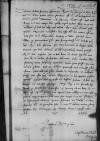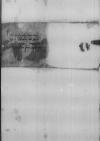List #3528
Mikołaj KRAPITZ Jr do Ioannes DANTISCUSKulmsee (Chełmża), 1532-03-13
Rękopiśmienne podstawy źródłowe:
Pomocnicze podstawy źródłowe:
Publikacje:
| ||||||||
Tekst + aparat krytyczny + komentarzZwykły tekstTekst + komentarzTekst + aparat krytyczny
Reverendissimo in Christo [Patri] on the margin⌈Patri paper damaged⌈[Patri]Patri paper damaged⌉[Patri] on the margin⌉ ac Domino, domino stain⌈[domino]domino stain⌉
Debitam dedito servitio oboedientiam.
Reverendissime in Christo Pater et Domine, domine gratiosissime.
Non potui celare secretum, quod mihi ab integerrimo amico, canonico quodam Warmiensi, 26 Februarii communicatum est his verbis:
„Binas a Dominatione Tua accepi litteras, quibus cupit certior fieri ac ex me intelligere, si sunt hic aliqui, qui velint reverendissimum
Reverendissime Domine. Negotium hoc in hunc diem mihi, hercle, sepultum erat. Cum tamen et antehac frequentius litteris meis dominos canonicos Warmienses, fautores meos singulares, rogaverim, huiusmodi scire posse, quae nunc in lucem prodiere, aut eos hoc ipsum ignorasse, aut noluisse prodere, aestimo. Cum autem nunc sciam, curabo et iam diligentius, ut intelligere possim, quae istic circa ecclesiam Warmiensem in hoc negotio posthac agentur. Cognita autem re gesta, non differam scribere venerabili domino
Quod reliquum est, Reverendissima Paternitas Vestra oro dignetur scire nullam tam rem esse neque parvam, neque magnam, quam non sim causa Reverendissimae Paternitatis Vestrae fidelissime et constantissime obiturus. Quam feliciter diu valere et citius secundum voluntatem ad sponsam suam Sanctae Trinitatis ecclesiam venire plurimum exopto.
Ex
Eiusdem Reverendissimae Paternitatis Vestrae capellanus


 BCz, 1596, p. 394
BCz, 1596, p. 394